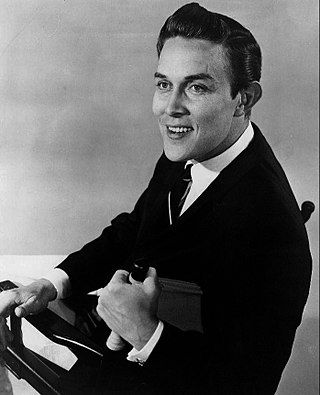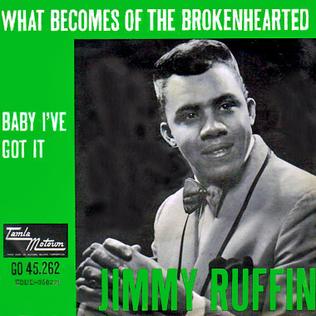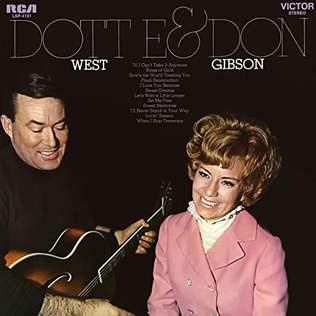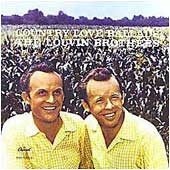
Harry Dean Stanton was an American actor. In a career that spanned more than six decades, Stanton played supporting roles in films including Cool Hand Luke (1967), Kelly's Heroes (1970), Dillinger (1973), The Godfather Part II (1974), Alien (1979), Escape from New York (1981), Christine (1983), Repo Man (1984), One Magic Christmas (1985), Pretty in Pink (1986), The Last Temptation of Christ (1988), Wild at Heart (1990), The Straight Story (1999), The Green Mile (1999), The Man Who Cried (2000), Alpha Dog (2006), Inland Empire (2006), Rango (2011), The Avengers (2012), and Seven Psychopaths (2012). He had rare lead roles in Paris, Texas (1984) and in Lucky (2017).

Jimmy Ray Dean was an American country music singer, television host, actor and businessman. He was the creator of the Jimmy Dean sausage brand as well as the spokesman for its TV commercials, and his likeness and voice continue to be used in advertisements after his death.

Robin and the 7 Hoods is a 1964 American musical film directed by Gordon Douglas and starring Frank Sinatra, Dean Martin, Sammy Davis Jr. and Bing Crosby. It features Peter Falk and Barbara Rush, with an uncredited cameo by Edward G. Robinson.
An answer song, response song or answer record is a song made in answer to a previous song, normally by another artist. The concept became widespread in blues and R&B recorded music in the 1930s to the 1950s. Answer songs were also popular in country music in the 1950s, 1960s, and 1970s, sometimes as female responses to an original hit by a male artist or male responses to a hit by a female artist.

The Louvin Brothers were an American musical duo composed of brothers Ira and Charlie Louvin. The brothers are cousins to John D. Loudermilk, a Nashville Songwriters Hall of Fame member.

Dottie West was an American country singer and songwriter. She also had several credits as an actress. A distinguished figure in the country genre, West was among several people who helped to elevate the platform of female country artists. She was also known for mentoring up-and-coming artists and being the first woman to win a country music accolade from the Grammy Awards.
Country USA was a 23-volume series issued by Time-Life Music during the late 1980s and early 1990s, spotlighting country music of the 1950s through early 1970s.

Dottie Rambo was an American gospel singer and songwriter. She was a Grammy winning solo artist and multiple Dove award-winning artist. Along with ex-husband Buck and daughter Reba, she formed the award-winning southern Gospel group, The Rambos. She wrote more than 2,500 songs, including her most notable, "The Holy Hills of Heaven Call Me", "He Looked Beyond My Fault and Saw My Need", "We Shall Behold Him", and "I Go To the Rock".

"Big Bad John" is a country song originally performed by Jimmy Dean, who wrote and composed it. It was released in September 1961 and by the beginning of November it had gone to number 1 on the Billboard Hot 100. It won Dean the 1962 Grammy Award for Best Country & Western Recording, and was nominated for the Grammy Award for Song of the Year.

"What Becomes of the Brokenhearted" is a hit single recorded by Jimmy Ruffin and released on Motown Records' Soul label in the summer of 1966. It is a ballad, with lead singer Jimmy Ruffin recalling the pain that befalls the broken-hearted who had love that's now departed.

"She's Got You" is a country song written by Hank Cochran and first recorded and released as a single by Patsy Cline. Musically the song is an upbeat jazz-pop song with country overtones to support it.

"Here Comes My Baby" is a song co-written and recorded by American country music artist Dottie West. It was released in June 1964 as the first single and title track from the album Here Comes My Baby. West wrote the song with her then-husband Bill.

With All My Heart and Soul is a studio album by American country music artist Dottie West. It was released in January 1967 on RCA Victor Records and was produced by Chet Atkins. It was West's fourth studio album as a recording artist after having her first major hit in 1964. The album included 12 tracks, including the single "Paper Mansions". The song became a top ten hit on the Billboard country chart following its release. The album itself would also chart on a similar Billboard country albums survey.

Dottie and Don is a studio album by American country music artists Don Gibson and Dottie West. It was released in March 1969 on RCA Victor Records and was produced by Chet Atkins and Danny Davis. The album was a collection of duet recordings between Gibson and West. It was both artists first album of duets to be recorded. Among the songs from the project, "Rings of Gold" became a major hit in 1969.

"(I'd Be) A Legend in My Time" is a song written and recorded by Don Gibson in 1960. It appeared as the B-side of his hit "Far Far Away", from the album Sweet Dreams. Gibson re-recorded the song on the 1972 album Country Green.

Country Love Ballads is an album by American country music duo The Louvin Brothers, released in 1958.

The Many Sides Of Neil Sedaka is a 1978 compilation album released by RCA Victor Records containing the works of pop singer Neil Sedaka. The album contains some of Sedaka's lesser-known works in the period from 1958-1965, although three of the songs on the album were charting hits at the time of their original release.

The singles discography of American country artist Dottie West contains 59 singles released as a solo artist, 12 singles released as a collaborative artist, 3 promotional singles and 1 other charting song. West signed with RCA Victor Records in 1963, having her first Top 40 hit the same year. It was followed in 1964 by "Love Is No Excuse", a duet with Jim Reeves that became West's first top 10 hit. In 1964, she also released "Here Comes My Baby". The song reached number 10 on the Billboard Hot Country Singles chart and became the first song by a female country artist to win a Grammy award. From her 1966 album, West issued four singles, including the top 10 hits "Would You Hold It Against Me" and "What's Come Over My Baby". Over the next two years she had major hits with "Paper Mansions", "Like a Fool", "Country Girl", and "Reno". In 1969, West collaborated with Don Gibson on "Rings of Gold", which reached number 2 on the Billboard country chart. In 1973, she released a single version of a commercial jingle originally used by The Coca-Cola Company. Entitled "Country Sunshine", the song became West's biggest hit, reaching number 2 on the country songs chart and number 49 on the Billboard Hot 100. The song also nominated her for her eleventh Grammy. After releasing the top 10 hit "Last Time I Saw Him" (1974), West's chart hits declined and she was dropped from RCA in 1976.

The albums discography of American country artist Dottie West contains 28 studio albums as a solo artist, five studio albums as a collaborative artist, 18 compilation albums and additional album appearance. Among West's studio releases were five collaborative albums with various artists, including Kenny Rogers. After signing with RCA Victor Records in 1963, West released her debut studio album Here Comes My Baby (1965). The album peaked at number 12 on the Billboard Top Country Albums chart in July 1965. West's third studio album Suffer Time (1966) spawned four singles, including "Would You Hold It Against Me", a top 5 hit on the Billboard Hot Country Songs chart. Suffer Time would reach number 3 on the country albums chart, West's highest-charting solo album. Between 1967 and 1968, West released 5 more studio albums. With All My Heart and Soul (1967) featured the top 10 hit "Paper Mansions" and the album itself peaked at number 8 on the Top Country Albums list. In 1969, she paired with Don Gibson for her first collaborative project Dottie and Don. The album featured the pair's number 2 Billboard country hit "Rings of Gold". In 1970, she collaborated with Jimmy Dean on the studio release Country Boy and Country Girl. In 1973, West had her biggest hit with the single "Country Sunshine". Its corresponding album of the same name peaked at number 17 on the country album chart in February 1974.

Country Boy & Country Girl is a studio album by American country music artists Jimmy Dean and Dottie West. It was released in November 1970 on RCA Victor Records and was produced by Jerry Bradley. The project was a collection duet recordings between both artists. It was Dean's first collaborative album and West's second. The album spawned one single entitled "Slowly", which would be released in 1971. Country Boy & Country Girl would also reach peak positions on national music publication charts following its release.















